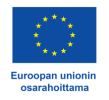The main goal of the project is to support the active agency and participation of young adults with neuropsychiatric disorders who are in a weak labour market position and at a high risk of disadvantage, so that their experience of their own self-reliance, independence, survival in everyday life, and their ability to work and function can be strengthened. With the strengthening of their own capabilities, young people can strengthen their own physical, psychological and social health, and with that, better opportunities for education and employment. In this project, the goal is aimed at strengthening young people's understanding of healthy nutrition and producing positive experiences in eating situations.

Goal
The main goal of the project is to support the active agency and participation of young adults with neuropsychiatric disorders who are in a weak labour market position and at a high risk of disadvantage, so that their experience of their own self-reliance, independence, survival in everyday life, and their ability to work and function can be strengthened. With the strengthening of their own capabilities, young people can strengthen their own physical, psychological and social health, and with that, better opportunities for education and employment. In this project, the goal is aimed at strengthening young people's understanding of healthy nutrition and producing positive experiences in eating situations. Interventions that strengthen inclusion, utilisation of positive experiences and peer support, and opportunities brought by visuality, and new virtual technologies are used as means. In addition, the project produces expert lectures on the topics of the project. People working in the close circle of young people with neuropsychiatric symptoms and close family members are involved in joint development.
It is an experimental project that utilises augmented reality technology, i.e. XR technology. In the project, applications are tested, collected data is analysed and the results are published for possible further development in the future. As a result of the project, approximately 30 young people with neuropsychiatric symptoms have had the opportunity to participate in the project's interventions; among other things, joint cooking and dining situations, dining supported by a virtual experience and compiling your own recipe book/portfolio. The interestingness and meaningfulness of the interventions has been evaluated with the help of the number of participations and the qualitative feedback data received from the participants, observations and experiences of the expert network. With the help of the collected material and the final surveys of the target group, information has been gathered about the connection between the interventions and the strengthening of young people's ability to function. The knowledge of the topic has been increased both for the close circle of the target group and through openly distributed material for all those interested in the topic.
30 people have participated in the jury of experts, whose expertise in the subject area has been strengthened. The long-term goal is that the young people who participated in the project's interventions are even more capable of surviving everyday life independently and have better resources to improve their own life situation, and their close circle is better prepared to support young people also from the point of view of nutrition issues. Their equal opportunities for active participation in society have improved. They are either in education or working life or applying for these.
Funding source
Contact persons
pilvi.torvinen [at] tuni.fi